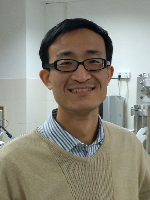张鲁凝 
张鲁凝 教授 博士生导师 联系电话:I58- OI8I- 5II9 Email:luningzhang@tongji.edu.cn 专业方向:分析化学 办公室:231 研究方向:微纳米尺度下化学分析 个人介绍 本研究组致力于发展微纳米尺度下光谱分析方法,结合物理学领域的声、光、热、电等方法,针对纳米颗粒、生物细胞、纳米膜等样品实现在纳米尺度下高效率、定向、定点地光子传送和信号采集。我们的研究内容包括基于激光非线性效应的单纳米颗粒成像、极端状态下的纳米材料光谱、基于纳米颗粒表面等离子体的传感方法、生物力学、以及光镊-光谱测量联用方法等。同时,我们承担了科技部重大仪器专项并且搭建了一套红外光解离谱-飞行时间质谱联用装置(IRMS),该仪器可以产生特定分子量的气相团簇并且得到其红外吸收光谱,从而同时获得分子量(质谱)和化学键(光谱)的信息,为研究新型团簇和化学价键结构提供了一种新的方法。 博士毕业于加州大学伯克利分校化学系,论文在非线性光学权威沈元壤(Yuen-Ron Shen) 教授指导下完成,副导师为光谱学家Richard Saykally教授。博士期间利用非线性激光光谱研究了几个代表性体系:对固体-液体界面电荷密度和分子排布的关系给出了光谱证据,研究了污染物在亲水、疏水界面的竞争吸附并提出了统一机理解释,率先考察了纳米材料-水界面的电荷密度、超疏水性和水分子氢键结构。研究结果为美国自然科学基金水处理系统中心WaterCAMPWS资助的主要成果之一。在斯坦福研究所博士后期间,参与完成美国宇航局NASA和美空军基础科学办公室AFOSR的两个材料科学项目,并完成一个石墨烯定向气相刻蚀的课题。于2012年进入同济大学化学系之前,曾担任西门子中国研究院创新研究员,负责应用领域的创新技术研发。具有丰富光谱分析研究经验和光谱仪器的设计搭建经验。 简历: 1998-2001 硕士,复旦大学。导师:秦启宗教授,周鸣飞教授。 2001-2008 博士,加州大学伯克利分校 U.C. Berkeley。导师:沈元壤 Yuen-Ron Shen。 2008.6-2010.9 博士后工作,斯坦福研究所 Stanford Research Institute (SRI International)。Jochen Marschall 研究组。 2010.9-2012.1 创新研究员 (Innovator),西门子中国分公司,西门子中国研究院(TTB, Technology-To-Business Center)。 2012- 至今 教授,博导,同济大学化学系。 . 课题组的网页: http://pchem.weebly.com . 代表科研论文: At Tongji University: 1.Microsphere Assisted Superresolution Optical Imaging of Plasmonic Interaction between Gold Nanoparticles, Beibei Hou, Mengran Xie, Ruoyu He, Minbiao Ji, Sonja Trummer, Rainer H. Fink, Luning Zhang, Scientific Reports, 2017, 7: 13789. | DOI:10.1038/s41598-017-14193-3 2.Sensing Parts per Million Level Ammonia and Parts per Billion Level Acetic Acid in the Gas Phase by Common Black Film with a Fluorescent pH Probe, Jingni Fu and Luning Zhang, Anal. Chem. 2018, 90, 1356−1362. | DOI: 10.1021/acs.analchem.7b04347 3.Probing pH difference between micellar solution and nanoscale water within common black film by fluorescent dye, Jingni Fu, Luning Zhang, Chem. Phys. 2018,504,1-7. | |https://doi.org/10.1016/j.chemphys.2018.02.013 4. Nanometer-Thick Newton Black Film for Selective Formaldehyde Gas Detection, Jingni Fu and Luning Zhang, Anal. Chem., 2018, 90 (13), 8080–8085. | DOI: 10.1021/acs.analchem.8b01254 5. Liquid microdroplet as an optical component to achieve imaging of 100nm nanostructures on a far-field microscope, Beibei Hou and Luning Zhang, J. Opt. 20 (2018) 055606 (7pp). | https://doi.org/10.1088/2040-8986/aaba2d 6.Application of Starch Granules for Imaging Samples with Sub-Diffraction limit features. Kemin Ye, Beibei Hou, Luning Zhang (to be submitted). 7. Monitoring Chemical Composition and Reaction by Acoustic Signal from a Vibrating Microliter Droplet, Liming Zhang and Luning Zhang (to be submitted). 8.Interfacial Heat Transfer Between A Single Gold Nanoparticle and Gas Environment Probed by Photothermal Imaging, Xiangxiong Li, Qing Xi, Jun Zhou, Luning Zhang (to be submitted). Before Tongji: (1) Laboratory Investigation of the Active Nitridation of Graphite by Atomic Nitrogen. L. Zhang, D. A. Pejakovic, J. Marschall, D. Fletcher, J. Thermophysics and Heat Transfer, 2012, 26(1), 10-21. https://www.aiaa.org/JournalDetail.aspx?id=3441 (2) Thermal and Electrical Transport Properties of Spark Plasma-Sintered HfB2 and ZrB2 Ceramics. L. Zhang, D. A. Pejakovic, J. Marschall, M. Gausch, J. Am. Ceram. Soc. 2011, 94, 2562-2570. http://onlinelibrary.wiley.com/doi/10.1111/j.1551-2916.2011.04411.x/abstract (3) Effect of pH on the water/alpha-sapphire (1-102) interface structure studied by Sum-Frequency Vibrational Spectroscopy. J. Sung, L. Zhang, C. S. Tian, G. A. Waychunas, Y. R. Shen, J. Phys. Chem. C 2011, 115, 13887. http://pubs.acs.org/doi/abs/10.1021/jp2046596 (4) Surface Modification of Highly Oriented Pyrolytic Graphite by Reaction with Atomic Nitrogen at High Temperatures. L. Zhang, D. A. Pejakovic, B. Geng, J. Marschall, Applied Surface Science, 2011, 257, 5647-5656. http://www.sciencedirect.com/science/article/pii/S0169433211001024 (5) Surface Structure of Protonated R-Sapphire (1-102) Studied by Sum-Frequency Vibrational Spectroscopy. J. Sung, L. Zhang, C. S. Tian, G. A. Waychunas, Y. R. Shen, J. Am. Chem. Soc. 2011, 133(1), 3846-3853. http://pubs.acs.org/doi/abs/10.1021/ja104042u (6) Nanoporous silica/Water Interfaces studied by Sum-Frequency Vibrational Spectroscopy. L. Zhang, C. S. Tian, Y. Wu, S. Singh, C. J. Brinker, M. A. Shannon, Y. R. Shen, J. Chem. Phys. 2009, 130, 154702. http://jcp.aip.org/resource/1/jcpsa6/v130/i15/p154702_s1 (7) High-Temperature Hydroxylation of Alumina Crystalline Surfaces. R. Chandrasekharan. L. Zhang, V. Ostroverkhov, S. Prakash, Y. Wu, Y. R. Shen, M. A. Shannon, Surface Science, 2008, 602, 1466. http://www.sciencedirect.com/science/article/pii/S0039602808001064 (8) Structures and charging of a-Alumina(0001)/water Interfaces studied by Sum-Frequency Vibrational Spectroscopy. L. Zhang, C. S. Tian, G. A. Waychunas, Y. R. Shen, J. Am. Chem. Soc. 2008, 130, 7686. http://pubs.acs.org/doi/abs/10.1021/ja8011116 (9) Competitive Molecular Adsorption at Liquid/Solid interfaces: A study by Sum-Frequency Vibrational Spectroscopy. L. Zhang, W. T. Liu, Y. R. Shen, D. G. Cahill, J. Phys. Chem. C 2007, 111(5), 2069. http://pubs.acs.org/doi/abs/10.1021/jp063926n |
